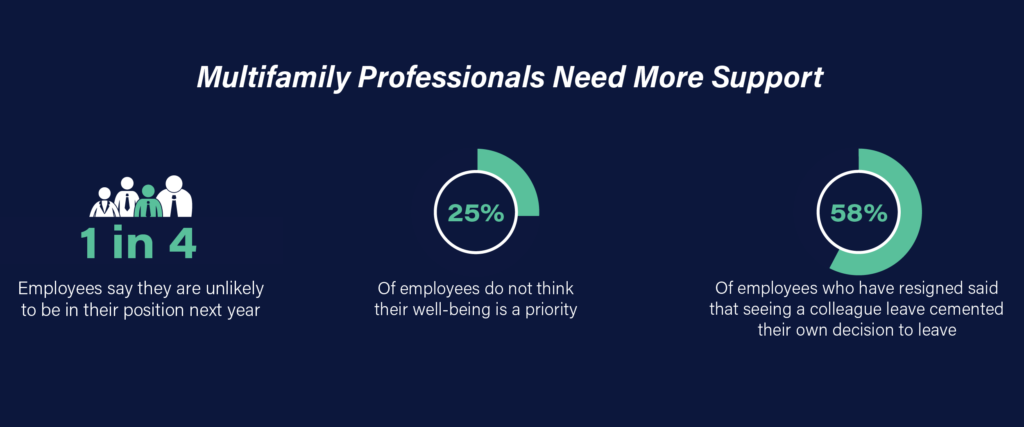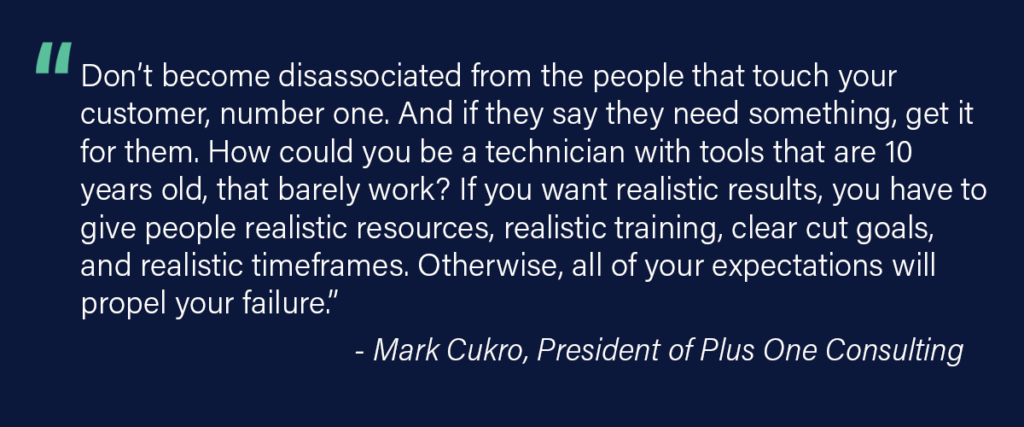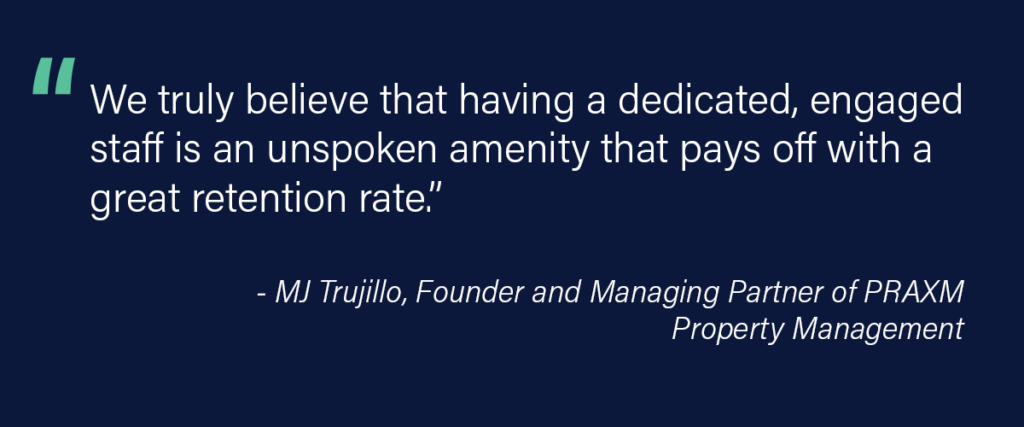How to lower employee turnover in property management
Employee turnover in property management hurts many parts of your business. Here’s how you can keep it to a minimum.
At Zego, we firmly believe that improving the resident experience is the most important opportunity facing multifamily companies. One of the most effective ways to do that is by making your employees happy. Happy and fulfilled employees are far more likely to be attentive and courteous to your residents than unhappy ones.
But sadly, one of the top challenges in the multifamily industry is keeping communities properly staffed. And over the past few years, employee turnover in property management has increased.


RENTER INSIGHTS
2025 Resident Experience Management Report
Building on five years of insights from property managers, our latest report includes direct feedback from renters. We’ve gathered perspectives from over 1,000 renters and 600 multifamily companies to provide a dual perspective on the current state of the multifamily resident experience.
What is the employee turnover rate in the multifamily industry?
Under normal circumstances, employee turnover for on-site multifamily property management teams is usually around 30-50%. This is higher than other industries. In the current labor market, the demands of being a property manager have only increased. Between rising expectations from renters, the non-stop demands of running a community, and lackluster salaries, many people get burned out.
In 2023, we asked apartment operators about turnover in our Resident Experience Management Report. Half of companies say they have higher employee turnover than a year ago.

Why does it matter how high employee turnover in property management is?
Clearly, the property management industry is having a hard time keeping employees. But is it having a negative impact on community life?
Absolutely. Without a full team of engaged employees, many parts of your business start to unravel.
Employee happiness impacts renter retention
Staffing levels play a big role in how your renters feel about the community. Picture a community that doesn’t have enough employees. Residents either have to wait to be helped or settle for solving their problems themselves.
People want swift service when it comes to their homes. Without team members to ensure seamless experiences are happening, satisfaction levels sink.
Under-served residents won’t stick around. For two years, Zego has tracked how staff retention affects resident retention. Our data shows that companies who have high property management employee turnover also have a hard time keeping renters too.

Or maybe you have enough people working, but they aren’t happy with their jobs. That certainly impacts the level of service your residents get. Happy and fulfilled employees are far more likely to be attentive to your residents than unhappy ones.
This leads to higher renewal rates. Grace Hill calculates that renters are 6% more likely to renew when a community has engaged employees.
Poor resident experiences affect reputation and leasing
Retention isn’t the only thing that suffers when a community doesn’t have enough engaged employees. The reviews for your property also take a hit.
Reputation’s Property Management Report finds that the #1 driver of negative reviews about a property is the service given in the rental office. When your on-site teams are overworked or unhappy in their job, that energy often carries over to the service they provide residents. This is important, because 56% of renters said the professionalism of the rental office was the biggest driver for them leaving a review.
Of course, this can lower the number of visits you get from potential renters. That’s because 79% of people say they will not visit a property if the reviews are bad.
And for the people who do end up visiting, an interaction with a disengaged community associate can be a turn-off. NAA reports that 20% of renters said on-site staff had a strong influence on their renting decision. Also, 55% said that staff caring about renters was the most important factor in selecting their apartment.
Resident Experience Podcast Episode 204
Don’t just think about leasing agents when it comes to employee turnover. Listen to how to set up your new service team members with success with “How (not) to lose your service team members in 90 days with Mark Cukro.”
Employee turnover isn’t prioritized enough in the multifamily industry
Why is property management turnover so high right now? One reason may be that companies aren’t putting enough effort into keeping their employees happy.
In 2022, Zego’s Resident Experience Management Report asked its survey respondents to rank their business priorities. Do you know what was at the very bottom of that list? Employee satisfaction and retention.

Some employees are clearly receiving the message that their job happiness isn’t important. NAA’s Mental and Emotional Health Survey surveyed 2,300 multifamily professionals. A quarter of them say that employee well-being isn’t a priority at their company.
Employees who question if their organization values their well-being will likely only be around for the short term. The same NAA survey found that 1 in 4 employees are unlikely to stay at their current job for another year.
Unfortunately, quitting is contagious. 58% of employees who have resigned in the past year said that seeing co-workers leave cemented their own decision to leave.

3 tips to lower employee turnover in property management
If you want to stop the cycle of losing employees, it’s time to rethink the employee experience. Because, as we’ve seen by our data, it’s clearly tied to resident retention. Aside from boosting wages, here are some ways to keep your team members happy.
1. Offer more self-service options to free up employee bandwidth
Working in an apartment community is extremely demanding. Community managers juggle so many duties. According to a Swift Bunny study, many say they can’t get their work done in the time allowed, causing them to regularly fall behind. Plus, 1 in 4 say their work suffers because they lack the needed resources to do their job.
This is why automation and self-service options are a community manager’s best friend. Many of your communities are short-staffed. And the associates you have are doing the job of more than one person. Self-service and automation frees up their time. Plus, it prevents burnout because they aren’t performing the same menial tasks over and over again.
Relying on technology isn’t short-changing your residents either. According to a Zendesk survey of their customers, 67% of consumers would rather use self-service channels than interact with a human. Our 2024 Resident Experience Management Report shares a preference among renters for self-service options to manage aspects of their apartment living. This demonstrates a shift towards digital convenience that allows residents to handle tasks quickly and efficiently. These on-demand services are also convenient for both residents and community managers.
Here are the best ways to use self-service in your community:
- Online rent payments
- Package lockers and alerts
- Digital maintenance work orders
- Resident app for communication
- Vehicle registrations
- Booking clubhouse spaces
- Registering guests
- Issuing temporary access codes to service workers
- Pet registrations
- Self-guided leasing tours
Automating community-level tasks used to worry on-site employees. Many felt that technology would be used to replace them. But since many communities are already lean on employees, automation has become a lifesaver. It lets employees make better use of their time and focus on face-to-face interaction with your residents. Highland Ranch REIT said in a call with analysts that its new technology offerings that automated many processes allowed it to cut its headcount by 30% and increase customer satisfaction scores by 24%!
2. Devote more time to training
Your communities have likely been understaffed for some time. So when a new hire starts, you may be tempted to have them dive in head first. Don’t do this!
Improper training is one of the top four reasons that lead to job unhappiness. Swift Bunny’s survey of community managers reported that 45% said their first week was disorganized. And 36% said they didn’t have enough time to train before they were expected to perform their duties.

So before you get your new hires on the front lines, make sure they fully grasp your company’s processes and technology platforms. This benefits them, plus it’s a better experience for residents who come to them seeking help. When they are properly trained, employees are more confident and deliver better outcomes – a win-win for everyone.
3. Check in and connect with on-site team members
This may not sound like groundbreaking advice, but regularly asking “How are you doing?” is rather effective in today’s burn and churn workforce.
On-site associates want to know they are valued team members. When they do, it leads to better performance. According to the ADP Research Institute, team members who said they trusted their team leader were 12 times more likely to be fully engaged at work.
Start building this trust by routinely asking them about their workload. Are they feeling overworked? What challenges are they facing?

Since there’s so much activity happening in community offices, it’s probably not wise to call them out of the blue to check in. That just disrupts their day. Plus, they may not be prepared to give honest feedback when a conversation is spur of the moment.
Instead, make sure to set aside time for regular check-ins. This allows team members to prepare the topics they want to share. Even if they don’t have any pressing issues to discuss, it gives them a platform to vent any concerns, frustrations, or even the high points of their job.
Improving employee experiences and resident experiences
Employee turnover in property management is clearly tied to the resident experience. But, there are other trends that are influencing resident experience. Thanks to a survey sponsored by American Express, we’ve gathered perspectives from over 1,000 renters and 600 multifamily companies to provide a dual perspective on the current state of the multifamily resident experience.
Transform your resident experience
Request a demo and see how you can elevate your resident experience, reduce turnover costs, and take your multifamily community to new heights.